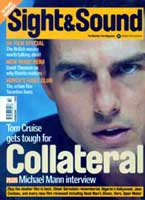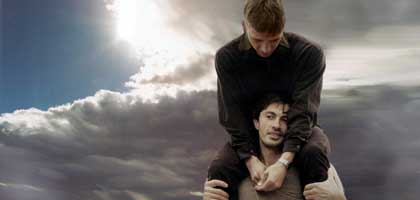
Father and Son
Germany/France/Russia/Italy/Netherlands/Switzerland 2003

Reviewed by Tony Rayns
Synopsis
Our synopses give away the plot in full, including surprise twists.
A fortyish father (Andrey Shchetinin) and his late-adolescent son Alexei (Aleksey Neymyshev) live together in a top-floor apartment and use the adjacent roof for exercise and play. Alexei is a military cadet, specialising in medicine and aiming to teach. His father was in the air force, but a combat wound to his lung has forced him to retire. He could take a well-paid job elsewhere, but is reluctant to leave Alexei; the fact that his son will eventually make his own way in life pains him. In the absence of Alexei’s mother, who died young, the two men have become almost preternaturally close. But when the father visits the military academy and (to Alexei’s embarrassment) watches the martial arts training, he cannot explain why he went.
Alexei’s sexual relationship with a girl in town is petering out, partly because she feels excluded by his closeness to his father. The father receives a visit from Fedor (Fedor Lavrov), the son of his former air force comrade Kolya. Briefly in town on vacation, Fedor is looking for his father, who was apparently thrown out by his wife when he became alcoholic. Alexei’s father knows what really happened (Kolya wanted to kill an incompetent commander, and is now dead) but cannot bring himself to tell Fedor. Alexei teases and intimidates Fedor, but promises to meet him later for a private talk. When it happens, though, their talk hinges on their opposed feelings about fathers. Fedor finds Alexei glib and insincere.
Back home, Alexei and his father start to talk about their future. When his father reacts over-emotionally to a promise that he will never leave him alone, Alexei deliberately provokes a scene by professing equal love for their neighbour Sasha. Both men sleep and dream. Alexei has his recurrent dream of finding himself alone on a country path. His father dreams of waking to find thick snow outside.
Review
Writing a synopsis is always an act of interpretation, deciding what is and isn’t essential to the meaning of a film, but writing a synopsis of a Sokurov film is more like an act of exegesis. Not that Sokurov is religiose – on the contrary, he’s much less in thrall to holy writ than his beloved Tarkovsky was – but he routinely clouds his work in the kind of mystification that makes it seem obscure to many viewers. This may or may not be a quintessentially Russian trait, but it’s certainly designed to boost the work’s aesthetic weight. Father and Son, which begins and ends in its characters’ dreams, goes out of its way to avoid obviousness. It takes place in a city of the mind (actually a composite of Lisbon and St Petersburg) and uses an idiosyncratic film language and grammar to minimise the sense that a story is being told and maximise the flavour of symbolism and parable. Under this barrage of aestheticism, though, beats a heart of pure soap opera.
Sokurov provided next to no real-world context for the dying mother and her adoring son in Mother and Son (Mat i syn, 1997, the first part of his projected trilogy about family relations), but Father and Son is in some ways very specific. It takes place more or less now (the suicidal mission that traumatised the father’s air force comrade Kolya happened in 1998, although the script typically refrains from mentioning Chechnya) and the dialogue provides fairly extensive and credible backstories for both protagonists.
The shadow of death hangs over the unnamed father – his chest x-rays are twice brandished symbolically – and the son Alexei, upset at being given the push by his first girlfriend, has everything to live for. Both of them are macho, military types; the father has a brief flashback to the combat in which he was wounded, while Alexei must make do, for the moment, with the stylised combat of judo practice or death-defying horseplay with his mates on a plank stretched between upper windows. The father knows that he will eventually ‘lose’ Alexei and die; Alexei knows that he will eventually move on and ‘abandon’ his father.
Sokurov is certainly smart enough to know that this schema is psychologically banal and dramatically thin; hence the need to complicate matters by ‘mythologising’ the relationship. (“Their love,” we read in the director’s notes, “cannot happen in real life. It’s the incarnation of a fairy tale.”) In practice, this entails presenting the father as a ‘new man’, a caring, fully domesticated surrogate for his late wife, and presenting Alexei as an infantilised adolescent, still calling for his mother as he wakes from recurrent nightmares and still settling for a maternal cuddle from Dad to get him through the distress. To deflect any suspicions of incestuous homo-eroticism in the relationship, Sokurov falls back on the device favoured by all ‘buddy-movie’ scriptwriters: he counterpoints his macho leads with a ‘gay’ supporting character, the voyeuristic sissy Sasha, who is always up on the roof looking for his cat or checking the weather when father and/or son are lounging or exercising in their underwear. Sasha yearns to move in with the Big Boys, and is gently rebuffed.
It goes without saying that there is something deeply silly and self-regarding about this grandiose exploration of a very ordinary psychological gestalt; it’s easy to see why it has attracted generally dismissive reviews. But, despite everything, the film has a cumulative power. It’s partly due to its digitally enhanced ‘look’: the autumnal, russet colour scheme, the diffused light, the soft-focus images, the haunting cutaways to seemingly irrelevant details during Alexei’s tram-ride with Kolya’s son Fedor. The key thing, though, is the relentless emphasis on the non-professional actors’ faces. Father and Son is probably the most densely edited film Sokurov has ever made. Conversations (such as Alexei’s with his ex-girlfriend) are presented in quick-fire crosscutting, and even moments of dramatic stasis (such as a protracted embrace) are reframed three or four times. All of this is designed to help us scrutinise the faces more closely, to uncover their secrets, and there’s nothing mystificatory about that at all.
Credits
- Director
- Alexander Sokurov
- Producer
- Thomas Kufus
- Screenplay
- Sergey Potepalov
- Director of Photography
- Alexander Burov
- Editor
- Sergey Ivanov
- Art Director
- Natalya Kochergina
- Composer
- Andrey Sigle
